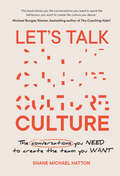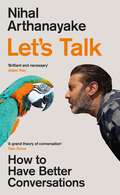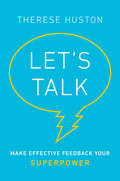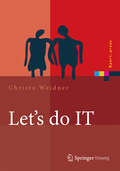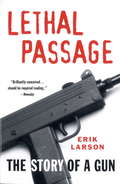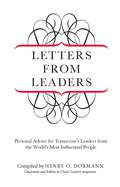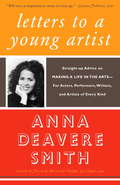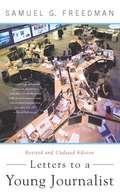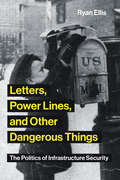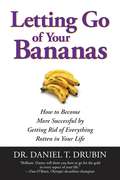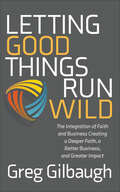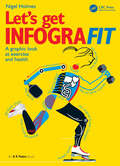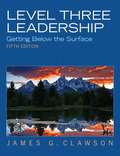- Table View
- List View
Let's Talk Culture: The conversations you need to create the team you want
by Shane Michael HattonPacked with research-based insights from leading workplaces, Let's Talk Culture is the how-to guide for people leaders who want to shape a world-class team culture by design. Successful leaders and organizations know that culture is the unseen advantage of world-class teams. But can it be influenced? And what role do managers play in building and shaping it?Author and expert in leader communication, Shane Michael Hatton, says the research suggests it can be influenced and that the people leader plays a crucial role – but it all starts with effective communication. Based on extensive research with people leaders on the ground, Let's Talk Culture reveals the five practical conversations people leaders need to have to design a world-class team culture within their organisation.An easy-to-understand guide for future culture champions, this book will give you the tools to build a team that attracts and retains your top talent, confidently address cultural inconsistencies in the workplace and meaningfully reward the behaviors that strengthen your team culture.
Let's Talk: How to Have Better Conversations
by Nihal Arthanayake'Read this fascinating book and you'll become a better listener, a better conversationalist and better company' Adam Kay'A brilliant book on the art of conversation' Matt Haig'A compulsory book for these divided times' Sathnam Sanghera'An intriguing exploration of the importance of a proper chinwag' Sara Cox'A terrific book from a terrific broadcaster. Worryingly good'' Jeremy Vine'An insightful, important read' Stacey Dooley'A genuinely brilliant broadcaster' Matthew Syed'A masterly book' Matthew d'Ancona 'Brilliant in the year and just as brilliant on the page' Anita Anand 'Fascinating and thought-provoking' Jane Fallon'Informed, open-minded, fair, astute, caring and funny' Ricky Gervais 'A grand theory of conversation' Dan Snow'The conversation king' Laura Whitmore...How do you talk to someone who doesn't want to talk to you?What happens in the brain when we're having a good conversation?What have smartphones done to how we connect?Conversations are broken. And while effective dialogue is supposed to lead to greater fulfilment in our personal and professional lives, all the scientific evidence points towards us sharing fewer interactions than previous generations. From ever decreasing face-to-face meetings to echo chambers online, we no longer have the necessary tools to talk to each other.Nihal Arthanayake is bucking this trend. As the world becomes increasingly more fractured, he has built a platform of 1.2 million listeners a week on BBC Radio 5 Live who regard him as one of the best people of his generation at having public conversations. Guests from the world's biggest stars to leaders of inner-city gangs have lauded his seemingly innate ability to stimulate positive discussions without the need for confrontation. Now he wants to understand how he developed his skills, what it exactly means to have a 'great conversation' and, most importantly, how he can teach us to have better interactions in our everyday lives.Let's Talk blends Nihal's experiences as an acclaimed interviewer with expert and celebrity opinion on the secrets and psychology behind successful communication. From tracing the evolution of dialogue to discovering what lights up in the brain when we're enjoying a good discussion, Nihal speaks to conversational authorities including Lorraine Kelly, former president of Ireland Mary McAleese, Professor Tanya Byron, internationally bestselling author Johann Hari, Matthew Syed, and many more, to find out why good conversation has eroded over time and how we can fix it.Part how-to and part manifesto, Let's Talk is Nihal's accessible, anecdotal and invigorating toolkit to having better conversations with anyone, any time.
Let's Talk: How to Have Better Conversations
by Nihal Arthanayake'Read this fascinating book and you'll become a better listener, a better conversationalist and better company' Adam Kay'A brilliant book on the art of conversation' Matt Haig'A compulsory book for these divided times' Sathnam Sanghera'An intriguing exploration of the importance of a proper chinwag' Sara Cox'A terrific book from a terrific broadcaster. Worryingly good'' Jeremy Vine'An insightful, important read' Stacey Dooley'A genuinely brilliant broadcaster' Matthew Syed'A masterly book' Matthew d'Ancona 'Brilliant in the year and just as brilliant on the page' Anita Anand 'Fascinating and thought-provoking' Jane Fallon'Informed, open-minded, fair, astute, caring and funny' Ricky Gervais 'A grand theory of conversation' Dan Snow'The conversation king' Laura Whitmore...How do you talk to someone who doesn't want to talk to you?What happens in the brain when we're having a good conversation?What have smartphones done to how we connect?Conversations are broken. And while effective dialogue is supposed to lead to greater fulfilment in our personal and professional lives, all the scientific evidence points towards us sharing fewer interactions than previous generations. From ever decreasing face-to-face meetings to echo chambers online, we no longer have the necessary tools to talk to each other.Nihal Arthanayake is bucking this trend. As the world becomes increasingly more fractured, he has built a platform of 1.2 million listeners a week on BBC Radio 5 Live who regard him as one of the best people of his generation at having public conversations. Guests from the world's biggest stars to leaders of inner-city gangs have lauded his seemingly innate ability to stimulate positive discussions without the need for confrontation. Now he wants to understand how he developed his skills, what it exactly means to have a 'great conversation' and, most importantly, how he can teach us to have better interactions in our everyday lives.Let's Talk blends Nihal's experiences as an acclaimed interviewer with expert and celebrity opinion on the secrets and psychology behind successful communication. From tracing the evolution of dialogue to discovering what lights up in the brain when we're enjoying a good discussion, Nihal speaks to conversational authorities including Lorraine Kelly, former president of Ireland Mary McAleese, Professor Tanya Byron, internationally bestselling author Johann Hari, Matthew Syed, and many more, to find out why good conversation has eroded over time and how we can fix it.Part how-to and part manifesto, Let's Talk is Nihal's accessible, anecdotal and invigorating toolkit to having better conversations with anyone, any time.
Let's Talk: Make Effective Feedback Your Superpower
by Therese HustonA game-changing model for giving effective feedback to peers, employees, or even your boss--without offending or demotivating.How are you supposed to tell someone that they're not meeting expectations without crushing their spirit? Regular feedback, when delivered skillfully, can turn average performers into the hardest workers and stars into superstars. Yet many see it as an awkward chore: Recent studies have revealed 37% of managers dread giving feedback, and 65% of employees wish their managers gave more feedback. This trail-blazing new model eliminates the guesswork. Dr. Therese Huston, the founding director of the Center for Excellence in Teaching and Learning at Seattle University, discovered that the key to being listened to is to listen. First, find out what kind of feedback an employee wants most: appreciation, coaching, or evaluation. If they crave one, they'll be more receptive once their need has been satisfied. Then Huston lays out counterintuitive strategies for delivering each type of feedback successfully, including: • Start by saying your good intentions out loud: it may feel unnecessary, but it makes all the difference. • Side with the person, not the problem: a bad habit or behavior is probably less entrenched than you think. • Give reports a chance to correct inaccurate feedback: they want an opportunity to talk more than they want you to be a good talker.This handbook will make a once-stressful ordeal feel natural, and, by greasing the wheels of regular feedback conversations, help managers improve performance, trust, and mutual understanding.
Let's do IT: Business-IT-Alignment im Dialog erreichen
by Christa WeidnerWertvolles Potenzial der IT bleibt zu Lasten des ROI in vielen Unternehmen ungenutzt. Doch sicherlich ist die Tatsache, dass die strategisch wichtige Unterstützung für das Business sich nicht voll entfalten kann, noch viel höher zu bewerten, da Marktanteile verloren oder gar nicht erst gewonnen werden. Der vorgestellte Ansatz geht davon aus, dass alles erforderliche Wissen für die beste Lösung bereits in der Organisation vorhanden ist. Dieser meist unentdeckte Schatz des kollektiven Wissens muss nur gehoben werden. Mithilfe von speziellen Methoden wird das kollektive Wissen aufgespürt, um so eine umfassende Liste mit Überlegungen, Anregungen, Konzepten oder Lösungen zu erhalten. Stakeholdermanagement und Change Management sind dabei inklusive. Der Ansatz verspricht, Wertschöpfung und Effizienzsteigerung durch die Einbindung und Motivation der Betroffenen. Die Projekte gewinnen an Planbarkeit und Risiken werden reduziert. Das Projektergebnis entspricht den Anforderungen und unterstützt das Business in optimaler Art und Weise.
Lethal Force: The True Toll of Police Shootings in America
by The Washington PostIn 2015, The Washington Post launched an unprecedented effort to account for every fatal shooting by an officer of the law. Their study has motivated the FBI to action, and changed the way we think of those who serve and protect. After a police officer shot and killed a black teenager in Ferguson, Missouri, the media began to pay greater attention to deadly interactions between black men and the law. But when reporters tried to get to the bottom of some basic questions—how often do police shoot people? Who are the victims? Are officers ever charged with crimes?—they came up blank. Police departments were not required to report these statistics to the FBI.The Washington Post set out to track every fatal shooting by an on-duty officer in 2015. Its database chronicled the shootings in real time, using news reports and other public sources. It compiled a trove of data, from the race of the person killed, whether the person was armed when killed, to whether the person was purported to have threatened the officer prior to being killed. The results found by the Post are shocking and haunting, from the sheer breadth of shootings by police in the U.S. to the stories of those killed. And its call to reform is being heeded. This groundbreaking book will radically alter how you view confrontation and accountability within the ranks, and offer a new perspective going forward.
Lethal Passage: The Story of a Gun
by Erik LarsonThis devastating book illuminates America's gun culture -- its manufacturers, dealers, buffs, and propagandists -- but also offers concrete solutions to our national epidemic of death by firearm. It begins with an account of a crime that is by now almost commonplace: on December 16, 1988, sixteen-year-old Nicholas Elliot walked into his Virginia high school with a Cobray M-11/9 and several hundred rounds of ammunition tucked in his backpack. By day's end, he had killed one teacher and severely wounded another.In Lethal Passage Erik Larson shows us how a disturbed teenager was able to buy a weapon advertised as "the gun that made the eighties roar." The result is a book that can -- and should -- save lives, and that has already become an essential text in the gun-control debate.With a new afterword."Touches on all aspects of the gun issue in this country. Gives great voice to that feeling...that something real must be done." --San Diego Union-Tribune"One of the most readable anti-gun treatises in years." --Washington Post Book World
Letters from Leaders: Personal Advice for Tomorrow's Leaders from the World's Most Influential People
by Henry DormannPossibly no one on Earth personally knows as many people at the helms of nations, businesses, religions, charitable organizations, and institutes of learning as Henry O. Dormann—founder, chairman, and editor-in-chief of LEADERS magazine, whose circulation is limited to such leading figures. Here, he brings together the first-ever exclusive collection of wisdom and inspiration addressed to young people from the world’s most influential people—advice on leadership, goal achievement, public service, and life journeys.Letters from Leaders is a beautifully designed book comprising nearly eighty letters from those who have done so much to shape our world today—from Muhammad Ali to four U.S. Presidents, Mikhail Gorbachev, King Bhumibol Adulyadej of Thailand and King Abdullah II of Jordan, and the Dalai Lama; from Cathie Black to T. Boone Pickens, Muriel Siebert, and Donald Trump. The letters, some as facsimile reproductions of handwritten originals, are each introduced with a biographical note by Dormann. As put so aptly by Dormann in his introduction, “All kings and queens, presidents, Nobel Laureates, chairmen and chairwomen, CEOs, and world leaders have one thing in common: They want what they have achieved to be useful and to be handed over to a younger generation. . . . The leaders in these pages have ‘lived’ and now offer their experiences as a treasure to ambitious and open minds—those who want to be something in life.”
Letters to a Young Artist: Straight-up Advice on Making a Life in the Arts-For Actors, Performers, Writers, and Artists of Every Kind
by Anna Deavere SmithAn inspiring and no-nonsense guide for aspiring artists of all stripes—from &“the most exciting individual in American theater&” (Newsweek). In vividly anecdotal letters to the young BZ, Anna Deavere Smith addresses the full spectrum of issues that all artists starting out will face: from questions of confidence, discipline, and self-esteem, to fame, failure, and fear, to staying healthy, presenting yourself effectively, building a diverse social and professional network, and using your art to promote social change. At once inspiring and no-nonsense, Letters to a Young Artist will challenge you, motivate you, and set you on a course to pursue your art without compromise.
Letters to a Young Journalist
by Samuel J. FreedmanOver the course of a thirty-year career, Samuel Freedman has excelled both at doing journalism and teaching it, and he passionately engages both of these endeavors in the pages of this book. As an author and journalist, Freedman has produced award-winning books, investigative series, opinion columns, and feature stories and has become a specialist in a wide variety of fields. As a teacher, he has shared his expertise and experience with hundreds of students, who have gone on to succeed in both print and broadcast media. In Letters to a Young Journalist, Freedman conducts an extended conversation with young journalists-from kids on the high school paper to graduates starting their first jobs. Whether he's talking about radio documentaries or TV news shows, Internet blogs, or backwater beats, shoeleather research or elegant prose, his goal is to explore the habits of mind that make an excellent journalist. It is no secret that journalism's mission is seriously imperiled these days, and Freedman's provocative ideas and fascinating stories offer students and journalists at all levels of experience wise guidance and professional inspiration.
Letters to a Young Journalist, Revised and Updated Edition
by Samuel G. FreedmanOver the course of a thirty-year career, Samuel Freedman has excelled both at doing journalism and teaching it, and he passionately engages both of these endeavors in the pages of this book. As an author and journalist, Freedman has produced award-winning books, investigative series, opinion columns, and feature stories and has become a specialist in a wide variety of fields. As a teacher, he has shared his expertise and experience with hundreds of students, who have gone on to succeed in both print and broadcast media. In Letters to a Young Journalist, Freedman conducts an extended conversation with young journalists-from kids on the high school paper to graduates starting their first jobs. Whether he's talking about radio documentaries or TV news shows, Internet blogs, or backwater beats, shoeleather research or elegant prose, his goal is to explore the habits of mind that make an excellent journalist. It is no secret that journalism's mission is seriously imperiled these days, and Freedman's provocative ideas and fascinating stories offer students and journalists at all levels of experience wise guidance and professional inspiration.
Letters to a Young Leader: A New Leadership for a New Generation
by Robert B. DenhardtIf you are interested in becoming a better leader, this book is a great place to start. Rather than using the familiar textbook approach, leadership expert Robert Denhardt offers practical lessons drawn from a lively year-long correspondence with two (fictional) former students about their experiences in leadership. The letters explore the deeply personal issues these and other young and emerging leaders are facing – what the skills and personal qualities are that you need for contemporary leadership, what will leadership mean to you and those you lead, and even why or why not you might want to become a leader. Along the way, the book speaks to the big picture, arguing that leadership today has been stripped of its historic contribution to creating meaningful human experience and has been reduced to a technical exercise in executive management. Based on his experience of teaching leadership to thousands of undergraduates, graduate students, and advanced practitioners, Denhardt speaks person-to-person with young leaders about their questions and their concerns as they enter into the somewhat flawed world of leadership today. The result is a call for a new leadership for a new generation. This book will be valuable to students enrolled in regular and executive degree programs in leadership, business management, public administration, nonprofit management, educational administration, and many other fields. It also speaks to young leaders out of school but committed to enhancing their leadership. Indeed, readers of all ages will learn lessons relevant to their own professional development.
Letters, Power Lines, and Other Dangerous Things: The Politics of Infrastructure Security (Infrastructures)
by Ryan EllisAn examination of how post-9/11 security concerns have transformed the public view and governance of infrastructure.After September 11, 2001, infrastructures—the mundane systems that undergird much of modern life—were suddenly considered “soft targets” that required immediate security enhancements. Infrastructure protection quickly became the multibillion dollar core of a new and expansive homeland security mission. In this book, Ryan Ellis examines how the long shadow of post-9/11 security concerns have remade and reordered infrastructure, arguing that it has been a stunning transformation. Ellis describes the way workers, civic groups, city councils, bureaucrats, and others used the threat of terrorism as a political resource, taking the opportunity not only to address security vulnerabilities but also to reassert a degree of public control over infrastructure. Nearly two decades after September 11, the threat of terrorism remains etched into the inner workings of infrastructures through new laws, regulations, technologies, and practices. Ellis maps these changes through an examination of three U.S. infrastructures: the postal system, the freight rail network, and the electric power grid. He describes, for example, how debates about protecting the mail from anthrax and other biological hazards spiraled into larger arguments over worker rights, the power of large-volume mailers, and the fortunes of old media in a new media world; how environmental activists leveraged post-9/11 security fears over shipments of hazardous materials to take on the rail industry and the chemical lobby; and how otherwise marginal federal regulators parlayed new mandatory cybersecurity standards for the electric power industry into a robust system of accountability.
Letting Go of Your Bananas: How to Become More Successful by Getting Rid of Everything Rotten in Your Life
by Daniel T. DrubinDo you tend to cling to old work habits? Fall into self-defeating, familiar ways of relating to the key people in your life? Now in this concise, step-by-step program, Dr. Daniel T. Drubin hands you 12 vital keys that can truly liberate you and your potential. You'll get all the tools you need, including a special to-do list at the end of every chapter that can bring immediate results; and illuminating stories from Dr. Drubin's own life, which will teach and inspire you.
Letting Good Things Run Wild: The Integration of Faith and Business Creating a Deeper Faith, a Better Business, and Greater Impact
by Greg GilbaughA practical, yet powerful resource that integrates personal faith with business interests to help readers deepen their faith while building a better business.
Lettuce Entertain You Enterprises (A): Turning Over a New Leaf?
by Lena G. Goldberg Michelle Lee Michael S. Kaufman Cordelia Shackleton Tara Tomimoto Zach AddyCase
Lettuce Entertain You Enterprises (B): Doing Right by Do-Rite Donuts
by Lena G. Goldberg Michael S. KaufmanSupplement
Letzte Ausfahrt Führung?
by Alexander Höhn Daniel F. Pinnow Bernhard RosenbergerIn diesem Buch diskutieren acht Führungs- und Personalexperten über das Phänomen „Führung“ und beantworten Fragen wie: Versagen moderne Führungskonzepte, wenn es einmal nicht so gut läuft? Wie viel Gefühl dürfen Manager zeigen? Wie können Führungskräfte ihre Organisationen für Veränderungen öffnen und begeistern? Mit drei aktuellen Beiträgen geben die Herausgeber in der 2. Auflage neue Impulse zur Führungsdiskussion.
Letzte Meile 4.0: Potenziale innovativer Technologien für die Auslieferung im B2C-Bereich (essentials)
by Irena Knezevic Wanja Wellbrock Daniela LudinDer letzte Schritt eines Paketzustellungsprozesses, die sogenannte letzte Meile, steht vor wachsenden Herausforderungen. Aktuelle Entwicklungen und Trends, wie die Urbanisierung und die zunehmende Bedeutung der ökologischen Nachhaltigkeit, erfordern eine Umgestaltung der letzten Meile. Darüber hinaus wachsen auch die Ansprüche der Kunden. Die Empfänger erwarten zunehmend individualisierte und personalisierte Zustelloptionen, weshalb neue Zustellkonzepte erforderlich sind. In diesem Zusammenhang kann der Einsatz innovativer Technologien aus dem Bereich der Logistik 4.0 und ihrer Kernelemente Konnektivität und Digitalisierung Chancen bieten, die Idee einer Last Mile 4.0 zu realisieren und die aktuellen Herausforderungen zu bewältigen.
Letzter Aufruf Kundenorientierung: Vom Sinn zum Gewinn - warum in einer digitalisierten Welt nur echte Kundenorientierung zu Gewinn führen wird
by Christian GündlingDieses Buch provoziert und fordert zum Nachdenken, Vordenken und Handeln heraus. Der Autor rüttelt wach und zeigt, wie der Kunde wieder konsequent als Ausgangspunkt und Ziel des unternehmerischen Erfolgs in den Fokus gerückt werden kann.Gündling schafft zunächst einen klaren Blick auf die Veränderungen von Märkten und Branchen resultierend aus der Digitalen Transformation, Robotik, sowie Big Data. Pessimisten werden ihre schlimmsten Befürchtungen bestätigt finden; sie werden auch lesen, dass das klassische Marketing keine Antworten auf diese neuen Herausforderungen hat und auch die Customer Journey eine Reise ohne Rückkehr ist. Optimisten lesen weiter und werden Lösungen in einer neuen und zeitgemäß definierten Kundenorientierung finden – unter Einbeziehung der Erkenntnisse der Verhaltensökonomie. Sie werden ein verändertes Verständnis für den Begriff „Qualität“ entwickeln sowie ein praktikables Konzept der Kundenerfahrung entdecken. Anschließend widmet sich der Autor der konkreten Umsetzung. Kundenorientierung ist zunächst einmal Menschenorientierung. Deshalb nehmen Themen wie Wertschätzung, Angst und Vertrauen einen großen Platz ein. Daraus ergeben sich zahlreiche Ansatzpunkte, wie Sie Ihrem Kunden wieder Orientierung geben und Bindung neu herstellen können. Nutzen Sie dieses Buch als Fundament für einen neuen und starken Fokus im Marketing und stellen Sie sich öfter mal die ehrliche Frage: „Macht das wirklich für den Kunden Sinn?“
Let’s Get Infografit: A Graphic Look at Exercise and Health (AK Peters Visualization Series)
by Nigel HolmesWhat do belly dancing, pickleball, mountain biking, metabolism, the food pyramid, yoga, the Greek Olympiad, Charles Atlas, broccoli, and tongue twisters have in common? Answer: they are all explained in Let’s Get Infografit, drawn in graphic detail.The book has a quick and easy exercise program, but it’s also a how-to-show-it graphics manual, with examples from Greek vases through 19th and 20th century exercise plans, as well diagrams that explain how to prepare for sports, and to repair any damage while participating in them. It deals with many aspects of exercise: why it’s good for you; what happens if you don’t move around enough; medical and anatomical explanations of soreness and exhaustion; the exhilaration of doing physical activity. It also includes a chapter on nutrition.What’s a dumbbell? Or a Burpee? Or a medicine ball? What makes you “hit the wall?” Do you really need to take 10,000 steps a day? (Hint: NO!) Why do golf balls have dimples? Driven by explanatory graphics both historic and contemporary, Let’s Get Infografit is about exercise and fitness for people who already love it, and also for people who know they should—but don’t! If you can smile while getting healthy at the same time you may learn to love it too.
Leuchtendes Vorbild!: Wie Sie mit Strahlkraft Ihr Unternehmen und die Welt verändern
by Andreas DudasDer Drang in den Unternehmen und bei den Führungskräften nach einer Veränderung ist allgegenwärtig, um global erfolgreich zu sein, ein erfülltes Leben zu führen und gleichzeitig aus der Masse herauszustechen. Doch die bloße Veränderung von Strategien, Prozessen oder der Unternehmenskultur alleine genügen nicht mehr, Unternehmen und Menschen erkennen immer mehr, dass nur eine radikale Transformation ihres (Führungs-)Verhaltens sowie ihrer Geschäftsmodelle nötig ist, um überhaupt zukunftsfähig zu sein. Andreas Dudas ist überzeugt: Dieser Weg führt nicht über den Aufruf nach drastischer Veränderung von Strategien und Prozessen oder nach der Umsetzung von Transformationsprozessen in Unternehmen. Der Weg führt über ein neues Bewusstsein und die Bewusstheit zur persönlichen Brillanz - zur persönlichen Strahlkraft, DIE eine Kraft, die alles ändert. Denn nur wer sich selbst wertschätzt, mit all seinen Stärken, eigenen Werten, Talenten und diese auch lebt, ist voll in seinem Element, bewegt Welten und beflügelt andere. Andreas Dudas nimmt in diesem Buch seine Leser auf eine spannende, weltweite Reise mit und erläutert - basierend auf seiner vielfältigen Erfahrung rund um den Globus -, wie er seine bewährte Transformations- und Erfolgsformel "Wer von innen strahlt, der bringt andere zum Leuchten" erfolgreich anwendet. Dabei öffnen sich nicht nur geografische, sondern auch in anderer Hinsicht völlig neue Perspektiven, in denen er zeigt, wie man Technologie, Wirtschaft, Management und Leadership mit Mentaltechnik, Quantenmechanik und Spiritualität zusammenführt, um eine persönliche Brillanz zu erreichen und gleichzeitig Welten zu bewegen.
Level 1/Level 2 Cambridge National in Enterprise & Marketing (J837) (J837) (J837) (J837): Second Edition: Second Edition
by Tess Bayley Leanna OliverTrust highly experienced authors, Tess Bayley and Leanna Oliver to guide your students through the refreshed Cambridge National Level 1/Level 2 in Marketing and Enterprise (for first teaching in September 2022). This brand-new edition will strengthen students' understanding of the content and boost the skills required to tackle the NEA with confidence.This Student Textbook is: > Comprehensive - gain in-depth knowledge of the examined unit with clear explanations of every concept and topic, plus improve understanding of the non-examined units with easy-to-follow chapters. > Accessible, reliable and trusted - structured to match the specification and provide the information required to build knowledge, understanding and skills. > Designed to support you - boost confidence when tackling the internal and external assessment with plenty of activities to test and consolidate knowledge. > Your go-to guide - expert authors have carefully designed tasks and activities to build skillset in order to aid progression and questions to assess understanding.
Level 1/Level 2 Cambridge National in Enterprise & Marketing (J837) (J837) (J837) (J837): Second Edition: Second Edition
by Tess Bayley Leanna OliverTrust highly experienced authors, Tess Bayley and Leanna Oliver to guide your students through the refreshed Cambridge National Level 1/Level 2 in Marketing and Enterprise (for first teaching in September 2022). This brand-new edition will strengthen students' understanding of the content and boost the skills required to tackle the NEA with confidence.This Student Textbook is: > Comprehensive - gain in-depth knowledge of the examined unit with clear explanations of every concept and topic, plus improve understanding of the non-examined units with easy-to-follow chapters. > Accessible, reliable and trusted - structured to match the specification and provide the information required to build knowledge, understanding and skills. > Designed to support you - boost confidence when tackling the internal and external assessment with plenty of activities to test and consolidate knowledge. > Your go-to guide - expert authors have carefully designed tasks and activities to build skillset in order to aid progression and questions to assess understanding.
Level Three Leadership: Getting Below the Surface
by James G. ClawsonLevel Three Leadership (L3L) prepares students and practicing managers to understand and apply principles of leadership. This is not a book that surveys the various leadership theories out there for the sake of intellectual knowledge and repetition on an exam (although the Appendix does that), rather L3L is about providing guidance to students of leadership in creating their own, practically applicable, model of influencing others.
